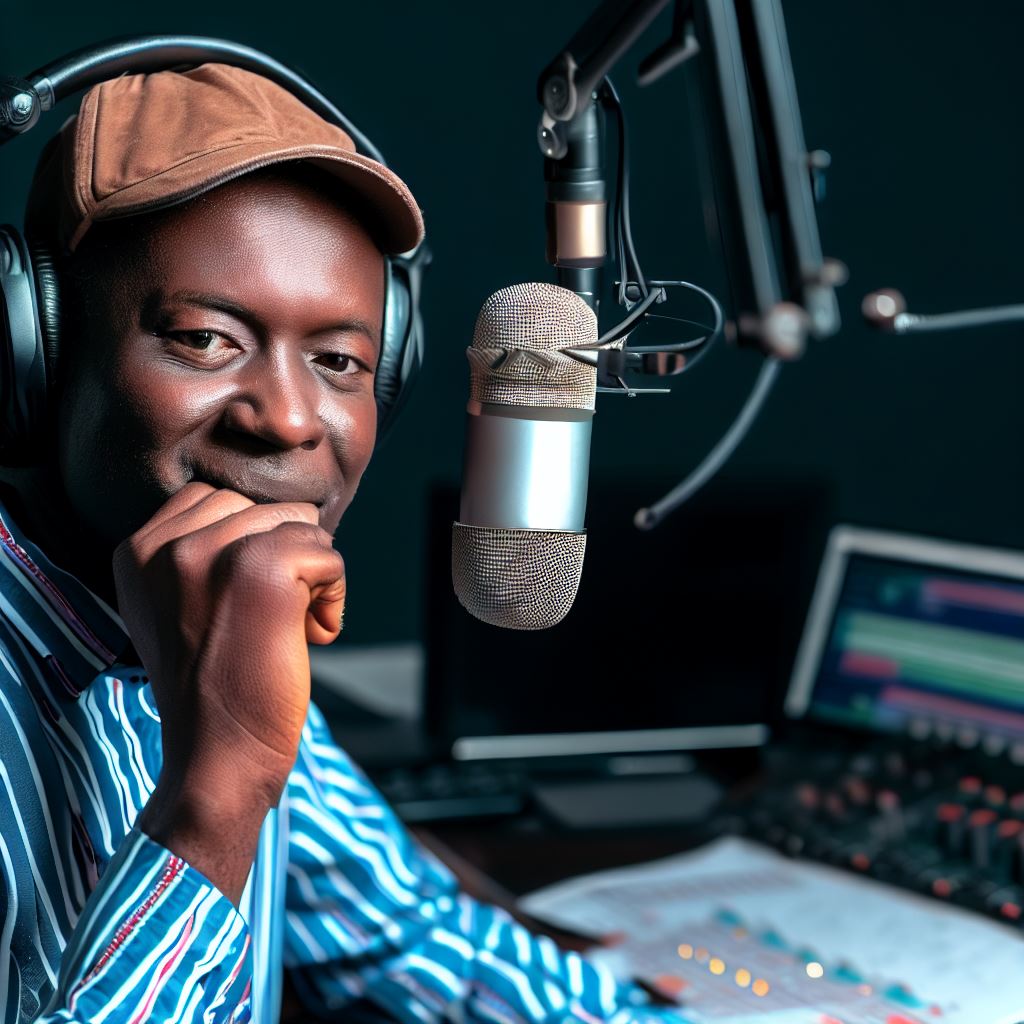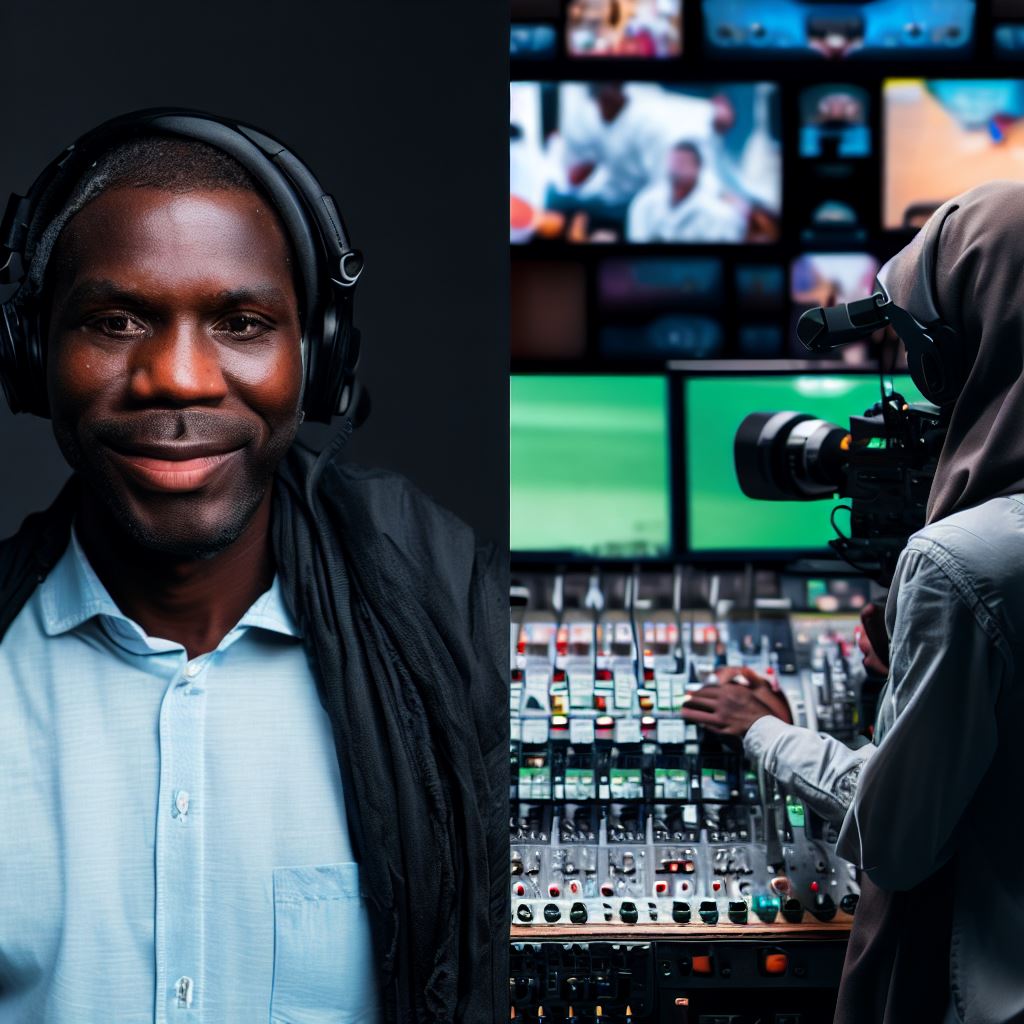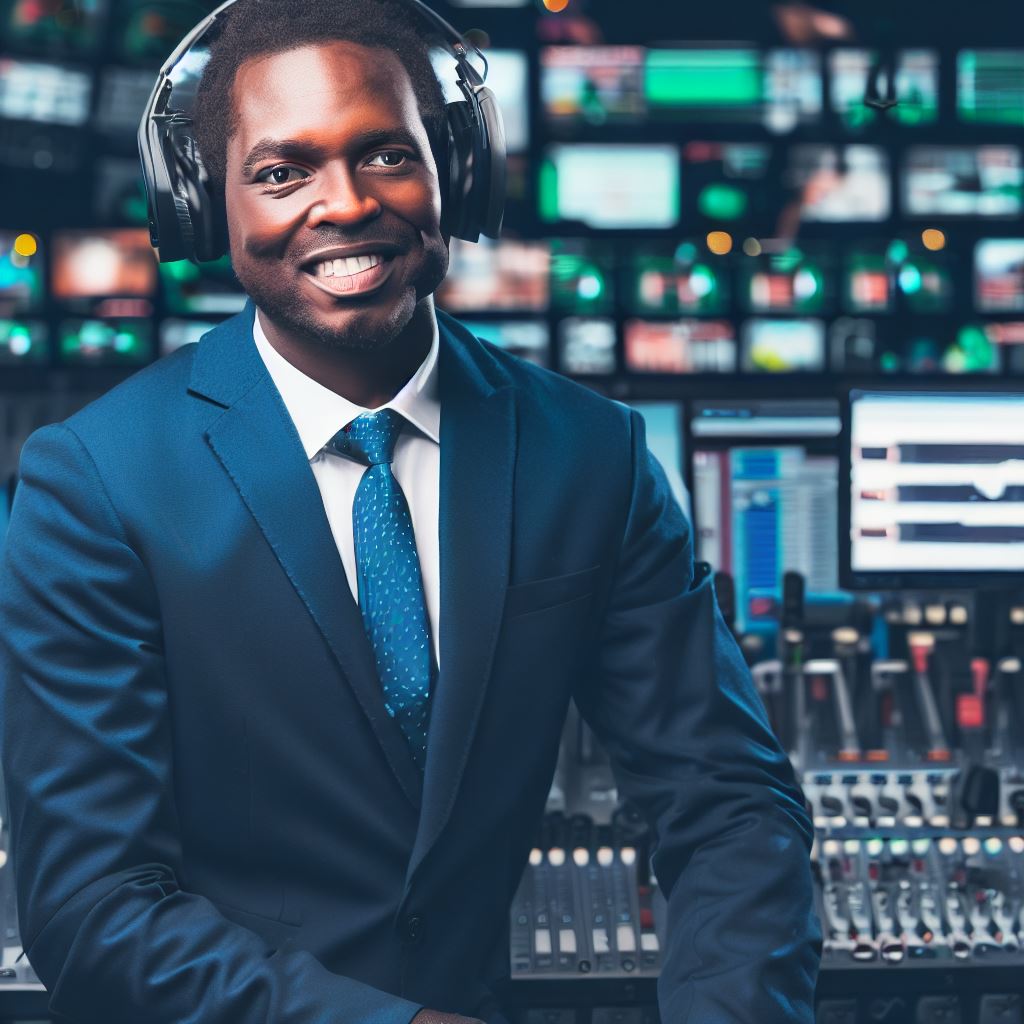Introduction
Let’s explore challenges faced by radio sports producers in Nigeria.
Radio sports producers in Nigeria encounter various obstacles in their field that hinder smooth operations and quality broadcasting.
Sports broadcasting in Nigeria holds immense significance as it serves as a major source of entertainment, offers national unity, and promotes talent development.
The purpose of this blog post is to shed light on the challenges faced by radio sports producers in Nigeria and offer insights into possible solutions.
The main points to be discussed include tight budgets, inadequate facilities, and lack of professional training opportunities.
Lack of Resources
Limited funding for sports production in radio stations
Radio sports producers in Nigeria often face the challenge of limited funding for sports production in their respective radio stations.
This lack of financial support hampers their ability to produce high-quality sports content.
The allocation of funds for sports programs is often scarce, as radio stations tend to prioritize other aspects of their operations.
This limited funding restricts the resources available for sports producers, hindering their ability to deliver comprehensive and engaging sports broadcasts.
Without adequate financial support, radio sports producers struggle to cover the costs associated with covering sporting events.
They may face difficulty in sourcing funds for travel expenses, equipment, and compensating their team members.
Inadequate equipment and technical resources
In addition to limited funding, radio sports producers in Nigeria also face challenges due to inadequate equipment and technical resources.
Many radio stations lack the necessary tools to deliver high-quality sports broadcasts.
Outdated equipment such as old microphones, soundboards, and recording devices can compromise the overall sound quality of the broadcasts.
This can make it difficult for listeners to fully engage with the sports coverage, affecting the overall appeal of the programs.
Furthermore, the lack of technical resources such as reliable internet connections and software can hinder the efficiency of radio sports producers.
This can result in delays or interruptions during live broadcasts, significantly diminishing the audience experience.
Difficulties in securing sponsorship for sports programs
Radio sports producers in Nigeria often face challenges in securing sponsorships for their sports programs.
Without sponsorship, it becomes challenging to sustain the production and delivery of quality sports content.
Securing sponsorship requires significant effort from the producers, including approaching businesses and convincing them of the value of supporting sports programs.
However, due to various factors, such as the economic climate and competing interests, sponsors may be hesitant to invest in sports productions.
Without secure sponsorship, radio sports producers may struggle to cover the costs of broadcasting rights, equipment maintenance, and hiring qualified staff.
This further exacerbates the challenges faced by producers in delivering top-notch sports broadcasts to the audience.
Impact of limited resources on the quality of sports broadcasts
The lack of resources, both in terms of funding and equipment, directly impacts the quality of sports broadcasts in Nigeria.
Radio sports producers, despite their dedication and passion, are unable to fully realize the potential of their programs.
With limited funding and outdated equipment, the overall production value of sports broadcasts suffers. The sound quality may be subpar, leading to a less immersive experience for listeners.
The lack of equipment and technical resources also restricts the ability to provide in-depth analysis and live updates during sporting events.
The absence of sponsorship and financial support affects the extent of coverage and variety of sports programs offered.
Without adequate funding, radio sports producers may only be able to cover popular sports, leaving niche sports and local events overlooked.
In short, the challenges faced by radio sports producers in Nigeria regarding the lack of resources severely hamper their ability to deliver high-quality sports broadcasts.
Limited funding, inadequate equipment, difficulties in securing sponsorship, and the resulting impact on broadcast quality are issues that need to be addressed to support the growth and development of sports programs in Nigerian radio.
Read: Becoming a Radio Sports Producer in Nigeria: A Guide
Limited Access to Sports Events
Being a radio sports producer in Nigeria comes with its fair share of challenges.
One of the major difficulties we face is the limited access to sports events.
This restriction has a significant impact on the quality and diversity of our sports broadcasts.
Difficulties in obtaining media accreditation for major sporting events
Securing media accreditation for major sporting events is not an easy task for radio sports producers in Nigeria.
The accreditation process can be complex and time-consuming, often requiring extensive paperwork and fulfilling certain criteria.
Without proper accreditation, we are not allowed entry into the venues, which means we are unable to bring live coverage of these high-profile events to our listeners.
This limitation forces us to rely on secondary sources for updates and commentary, reducing the authenticity and immediacy of our broadcasts.
Competition with larger media outlets for access to sports events
In addition to the accreditation hurdles, radio sports producers in Nigeria face stiff competition from larger media outlets.
These outlets often have more resources and influence, allowing them privileged access to sports events.
As a result, we are left scrambling for the remaining opportunities to cover sports events.
This puts us at a disadvantage and limits our ability to provide comprehensive and diverse coverage of different sports disciplines.
Challenges faced in covering remote or rural sports events
Radio sports producers also encounter challenges when it comes to covering remote or rural sports events.
These events are often held in locations with limited infrastructure, making it difficult for us to transport our equipment and set up broadcast stations.
Moreover, remote areas may have weak or unreliable internet connectivity, hindering our ability to stream live broadcasts or access real-time updates.
This lack of coverage deprives our audience of engaging with and supporting local athletes and sports teams.
The impact of limited access on the diversity and coverage of sports broadcasts
The limited access to sports events in Nigeria has a direct impact on the diversity and coverage of sports broadcasts.
Due to the struggles we face in obtaining accreditation and competing with larger media outlets, our coverage becomes skewed towards popular sports and major events.
This limited scope prevents us from highlighting lesser-known sports and athletes, who also deserve recognition and support.
It hampers the growth and development of a diverse sports culture in Nigeria and restricts our listeners’ exposure to a wider range of sporting activities.
In fact, radio sports producers in Nigeria encounter numerous challenges related to limited access to sports events.
Difficulties in obtaining media accreditation, competition with larger media outlets, coverage limitations in remote areas, and the impact on diversity all pose hurdles to providing comprehensive and inclusive sports broadcasts.
Nevertheless, we remain dedicated to overcoming these challenges and ensuring that our listeners get the best sports coverage possible.
Read: Roles & Duties of a Radio Sports Producer in Nigeria

Language Barrier
The challenge of broadcasting sports commentary in multiple Nigerian languages
One of the significant challenges faced by radio sports producers in Nigeria is broadcasting sports commentary in multiple Nigerian languages.
Nigeria is a diverse country with over 250 ethnic groups, each having its own unique language.
For radio sports producers, this poses a challenge as they have to cater to the linguistic preferences of different regions and communities within Nigeria.
It requires them to have a deep understanding of the language and culture of each region to effectively communicate the sports commentary.
Difficulties faced in translating international sports jargon to local languages
Another difficulty faced by radio sports producers is translating international sports jargon into local languages.
Sports jargon, such as technical terms and phrases commonly used in sports broadcasts, may not have direct equivalents in Nigerian languages.
This creates a communication gap between the broadcasters and the audience.
It becomes crucial for the producers to find innovative ways to convey the sport-related information accurately while ensuring it is easily understandable and relatable to the local audience.
The importance of multilingual sports broadcasters to reach a wider audience
Having multilingual sports broadcasters is of utmost importance in Nigeria to reach a wider audience.
By utilizing broadcasters who can communicate in different Nigerian languages, radio sports producers can effectively engage with diverse communities and regions.
This not only helps in building a stronger connection with the audience but also provides a platform for promoting local sports and athletes.
Broadcasting in local languages creates a sense of belonging and inclusiveness, making the audience feel valued and represented.
Strategies to overcome language barriers in radio sports production
To overcome language barriers in radio sports production, there are several strategies that can be employed.
Radio sports producers can provide brief explanations in English or a widely understood language for complex sports jargon that does not have direct translations.
They can also incorporate local idioms and expressions to make the commentary more relatable.
Additionally, training programs can be organized to enhance the language skills of sports broadcasters, enabling them to effectively communicate in multiple Nigerian languages.
Furthermore, collaborations with local language experts can provide valuable insights and guidance in ensuring accurate translations.
Embracing technology and using innovative translation tools can also aid in bridging the language gap and improving the overall quality of radio sports production in Nigeria.
In essence, language barriers pose significant challenges for radio sports producers in Nigeria.
Broadcasting in multiple Nigerian languages and translating international sports jargon requires careful consideration and expertise.
However, by utilizing multilingual sports broadcasters and employing effective strategies, these challenges can be overcome, enabling the producers to reach a wider audience and foster inclusiveness in sports broadcasting.
Read: Top Radio Sports Producers in Nigeria: A Spotlight
Technical Issues
Unreliable electricity supply affecting live sports broadcasts
One of the major challenges faced by radio sports producers in Nigeria is the unreliable electricity supply.
This poses a significant problem as it directly affects the broadcast of live sports events.
Power outages and fluctuations can interrupt the broadcast, causing inconvenience to the listeners and negatively impacting the production team.
Poor network coverage in some areas hindering radio sports production
Another technical challenge faced by radio sports producers in Nigeria is poor network coverage in certain areas.
This issue hinders the ability to transmit live broadcasts to listeners, limiting their access to sports news and updates.
It also affects the quality of the broadcasts, resulting in distorted or interrupted signals.
Challenges in ensuring smooth technical operations during live broadcasts
The seamless execution of technical operations during live broadcasts is crucial for radio sports producers.
However, there are various challenges that hinder smooth operations, such as equipment malfunction, signal interference, and connectivity issues.
These challenges require immediate resolution to ensure uninterrupted and high-quality sports broadcasts.
Measures to mitigate technical issues in radio sports production
To mitigate the technical challenges faced by radio sports producers in Nigeria, several measures can be implemented.
Publish Your Professional Profile, Business or Brand
Showcase your expertise, gain trust, and boost visibility instantly on Professions.ng.
Publish NowFirstly, investing in backup power sources, such as generators and uninterruptible power supply (UPS) systems, can help maintain continuous electricity supply.
This will reduce the risk of power interruptions during live broadcasts.
Secondly, improving network infrastructure and coverage in remote areas can enhance the reach and accessibility of radio sports broadcasts.
Collaborating with telecommunication companies to address connectivity issues and expand network coverage will significantly contribute to overcoming this challenge.
Additionally, conducting regular maintenance and upgrading of broadcasting equipment is essential to minimize malfunctioning and signal interference.
Proper training of staff on technical operations and troubleshooting techniques is also crucial to ensure operational efficiency during live broadcasts.
Furthermore, establishing partnerships with sports organizations and sponsors can provide funding opportunities for technical upgrades and the adoption of advanced broadcast technologies.
This will help radio sports producers stay technologically up-to-date and better equipped to handle technical challenges.
In general, radio sports producers in Nigeria face several technical challenges that affect the smooth execution of live broadcasts.
Unreliable electricity supply, poor network coverage, and difficulties in ensuring smooth technical operations are the major hurdles faced.
However, implementing measures such as backup power sources, network infrastructure improvement, regular equipment maintenance, and staff training can mitigate these challenges.
By addressing these technical issues, radio sports producers can enhance the quality and reach of sports broadcasts, providing an improved experience for listeners across Nigeria.
Read: Nigeria’s Radio Sports Production: Trends & Insights
Lack of Professional Training
In the fast-paced world of sports broadcasting in Nigeria, radio sports producers face numerous challenges.
One of the biggest hurdles they encounter is the lack of professional training.
This section will explore the difficulties that arise from this issue and propose potential solutions.
Limited opportunities for sports producers to receive professional training
The first challenge lies in the limited opportunities available for radio sports producers to receive professional training.
Many individuals start their careers in broadcasting without any formal education or training specific to sports production.
This lack of knowledge and skills can hinder their ability to perform at the highest level.
The importance of continuous professional development for radio sports producers
Continuous professional development is crucial for radio sports producers to remain relevant and competitive in the industry.
Technology and broadcasting techniques are constantly evolving, and producers need to keep up with these advancements to deliver high-quality sports coverage.
Without ongoing training, their skills may stagnate, and they will struggle to meet the demands of the ever-changing sports media landscape.
Collaboration with international sports broadcasting organizations to enhance training opportunities
To overcome the lack of training opportunities domestically, collaborations with international sports broadcasting organizations can be beneficial.
By partnering with established entities in countries with robust sports production industries, Nigerian radio sports producers can gain exposure to advanced training programs and learn from experts in the field.
Such collaborations can also foster knowledge exchange and create networking opportunities.
Advocacy for the improvement of professional training in radio sports production
Additionally, advocacy efforts must be made to improve professional training in radio sports production within Nigeria.
Stakeholders, including sports organizations, broadcasting regulatory bodies, and media professionals, should recognize the importance of investing in training initiatives.
By prioritizing the development of producers’ skills, the overall quality of sports broadcasts in the country will improve, benefiting both producers and audiences.
In review, the challenges faced by radio sports producers in Nigeria due to the lack of professional training are significant.
However, solutions exist. Increasing training opportunities, emphasizing continuous professional development, collaborating with international organizations, and advocating for improved training initiatives can all contribute to addressing this issue.
By investing in the skills and knowledge of radio sports producers, Nigeria can enhance the quality of its sports broadcasting industry and provide a more engaging experience for sports fans nationwide.
Conclusion
The main challenges faced by radio sports producers in Nigeria include limited resources, technical difficulties, and lack of support.
Addressing these challenges is significant for the growth of sports broadcasting in the country as it will improve the quality and reach of coverage.
Recap of main challenges faced by radio sports producers in Nigeria
Radio sports producers in Nigeria face a number of challenges, including:
- Lack of access to training and resources
- Outdated equipment and technology
- Low pay and poor working conditions
- Lack of recognition and appreciation
Significance of addressing these challenges for the growth of sports broadcasting in the country
Addressing these challenges is essential for the growth of sports broadcasting in Nigeria. By investing in radio sports producers, stakeholders can help to improve the quality of sports broadcasting in the country and make it more accessible to fans.
Call to action for stakeholders to invest in and support radio sports production in Nigeria
I urge all stakeholders to invest in and support radio sports production in Nigeria. By doing so, we can help to create a more vibrant and competitive sports broadcasting landscape in the country.
Stakeholders need to invest in and support radio sports production in Nigeria to ensure its success and contribute to the development of the sports industry.




